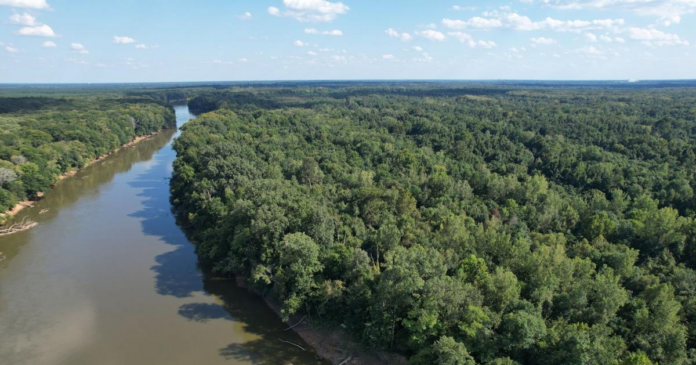FLORENCE — The purchase of 8,460 acres of forestland with 8 miles of Great Pee Dee River frontage will make Francis Marion University the second largest public university landholder in the state — second to only Clemson University.
But that isn’t what matters to school President Luther “Fred” Carter who said the university is not “in it for bragging rights.”
Instead, Francis Marion plans on using the land for its upcoming forestry program alongside other environmental programs the school offers.
The recent formation of a partnership will see the almost 8,500 acres of conservation land in Florence and Darlington counties secured for the educational endeavor.
The partnership includes FMU, the Open Space Institute, Florence County, the SC Office of Resilience, the SC Conservation Bank, the Darla Moore Foundation and a coalition of additional government and local partners to secure large acreage.
Florence County most recently agreed to provide $1.55 million to advance the project at its October meeting, adding on to $16 million from the Office of Resilience through the Conservation Bank, according to Open Space Institute Vice President Maria Whitehead.
The land itself is made up of bottomland hardwood and mixed upland pine. It was once part of Hartsville-based packaging company Sonoco’s land holdings. But when those holdings were to be sold, the state was eager to see some of the land move into conservation ownership, Whitehead said.
“I’m proud of the governor,” Carter said about Gov. Henry McMaster’s Conservation efforts. “I’m also very proud of our county council. You know, there aren’t a lot of county councils around this state that are as committed to conservation efforts as our county council is.”
Carter said that as the university developed its forestry program, they looked at various sites to serve as field sites for students. Some were as far away as Dillion and Marlboro counties.
The “Duck Ponds” property, as it has been called, is only 15 minutes from campus.
The property “meets every criteria that we could imagine in terms of size, and in terms of distance, and in terms of topography and geography,” Carter said. “It is so close to campus it’s almost ideal for us.”
The property is also large enough that forestry students will have plenty of room to develop “a variety of different forest products both for conservation and production process and not run out of room,” Carter said.
FMU began planning for a forestry program about five years ago, Carter said, and the new program is set to begin next August.
The university is also working on a new building dedicated to the program. The construction of a new forestry building is anticipated to be complete in the spring of 2027.
Access to the land will be similar to one of the university’s recent projects, the opening of the Freshwater Ecology Center. The center is used by students for labs and research, but it can also be accessed by the public on certain days of the week for free fishing at the property’s lake or walking along some of the area’s short trails.
“It’s such an exciting outcome that the university is willing to step in to be that steward of the land and that it’ll serve this dual purpose of really complimenting education at Francis Marion, but also creating this incredible community asset for Florence County,” Whitehead said.
Open Space Institute plans to acquire the 8,460-acre “Duck Ponds” properties from clients of Manulife Investment Management, one of the world’s leading natural capital investment managers, by the end of the year. The institute will hold the properties until they can be transferred to FMU.
Two state entities have to be gone through before the acquisition is final, the Joint Bond Review Committee and the State Fiscal Accountability Authority, Carter said.
Carter said it may sound sentimental, but he likes the idea that 30 years from now students who studied forestry at the university can take their children to the same land where they learned to be a forester.
Conservation efforts have been widespread in the Pee Dee in recent years. Another site on the Great Pee Dee River, Witherspoon Island, was conserved when a conservation easement was created to keep the island intact.
In 2024, Open Space Institute helped with the acquisition of Snow’s Island, ground zero for Gen. Francis Marion during the Revolutionary War and a key site in South Carolina and U.S. history, according to previous The Post and Courier reporting.
This past September, 305-acres of wetland forest in Britton’s Neck that was once the site of a plantation and was then used for logging will become a community park after it was obtained by conservationists.




